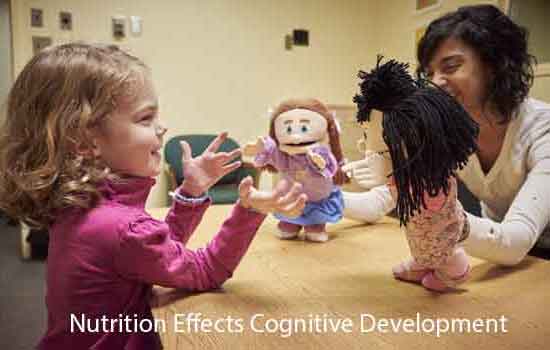Cognitive Development

In developing countries, millions of young children suffer from nutritional deficiencies and frequent infections. There is now a large and increasing body of evidence to indicate that nutrition and health affect children’s cognitive, motor, and behavioral development, both pre-and postnatally.
The situation is further complicated in those children who suffer from nutritional deficiencies. Infections usually come from poor socio-cultural environments and suffer from a myriad of deprivations and disadvantages that could themselves be detrimental to intellectual and behavioral development.
Overview

Cognition represents a complex set of higher mental functions subserved by the brain and includes attention, memory, thinking, learning, and perception. Cognitive development is influenced by many factors, including nutrition.
There is an increasing body of literature that suggests a connection between improved nutrition and optimal brain function. Nutrients provide building blocks that play a critical role in cell proliferation, DNA synthesis, neurotransmitter, and hormone metabolism, and are important constituents of enzyme systems in the brain. Brain development is faster in the early years of life compared to the rest of the body. It may make it more vulnerable to dietary deficiencies.
There is a link between nutritional intake in pregnancy and childhood and children’s cognitive development.
Let us discuss individual micronutrients and single aspects of diet and the role of nutrition in neurocognitive development. The understanding of the functional and structural development of the human brain has emerged from a range of methodologies.
Brain development is a temporally extended and complex process, with different parts and functions of the brain developing at different times:-
By 5 weeks after conception in humans, the anterior-posterior and dorsal-ventral axes of the neural tube have already developed.
The cortical plate and some inter-neuronal connections form from 8 to 16 weeks of gestation.
From 24 weeks of gestation until the prenatal period, the neurons in the cortical plate die and are replaced by more mature cortical neurons.
From 34 weeks post-conception until 2 years of age, peak synapse development, and significant brain growth occurs.
At preschool age, synaptic density has reached the adult level. The myelination of some parts of the brain (particularly those that control higher cognitive functions, such as the frontal lobes) continues well into adolescence.
The maturation of specific brain areas during childhood is associated with the development of specific cognitive functions such as language, reading, and memory.
The maturation of specific brain areas during childhood links with the development of specific cognitive functions such as language, reading, and memory.
The development of some subcortical structures including the basal ganglia, amygdala, and hippocampus (which are also in some mediating higher cognitive functions, including memory, executive functions, and emotion) also continues until late adolescence.
The research evidence shows that cognitive development is has a link with micro and macro-anatomical changes that take place throughout childhood. It is has the influence of environmental factors including nutrition.
Nutrition is one of the most salient environmental factors, and that nutrition can have a direct effect on gene expression.
The timing of nutritional deficiencies can significantly affect brain development. For example, it is folic acid deficiency results in malformation, called a neural tube defect. Since rapid brain growth occurs during the first 2 years of life. So we must be alerting particularly sensitive to deficiencies in the diet.
NUTRIENTS THAT EFFECT COGNITIVE DEVELOPMENT
- Omega-3 fatty acids:-
Essential fatty acids play a central functional role in brain tissue. They are not only the basic components of neuronal membranes, but they modulate membrane fluidity and volume and thereby influence receptor and enzyme activities in addition to affecting ion channels. Essential fatty acids are also precursors for active mediators that play a key role in inflammation and immune reaction.

HOW IT WORKS:-
The effect of essential fatty acids, particularly long-chain polyunsaturated fatty acids (LCPUFA), on cognitive brain development. Of the human brain’s dry weight 60% contains of lipids, of which 20% are docosahexaenoic acid (which is an omega3 fatty acid) and arachidonic acid (an omega-6 fatty acid). The supply of long-chain polyunsaturated fatty acids from food, especially the omega-3 fatty acids, including docosahexaenoic acid and eicosapentaenoic acid is frequently inadequate for children as well as for adults.
They promote neuronally and dendrite spine growth and synaptic membrane synthesis, and hence influence signal processing, and neural transmission.
Also, essential fatty acids regulate gene expression in the brain.
It has been suggested that the fast growth of the human cerebral cortex during the last two million years was strongly related to the balanced dietary intake of long-chain polyunsaturated fatty acids with an equal ratio of omega-6 and omega-3 fatty acids in the diet.
The docosahexaenoic acid component is to be one of the main reasons why breast milk may improve the cognitive performance of children. Humans can endogenously synthesize docosahexaenoic acid from precursor α-linolenic acid. However, the conversion rate varies according to genetically determined polymorphisms in two genes.
Vitamin B12, folic acid, and choline:-
There has been an increasing interest in the association between vitamin B12, folic acid, choline metabolism, and cognitive development.
HOW IT EFFECTS:
Folate affects neural stem cell proliferation and differentiation, decreases apoptosis, alters Deoxyribonucleic acid biosynthesis, and has an important role in homocysteine and S-adenosylmethionine biosynthesis.
S-adenosylmethionine is one of the main methyl donors in different metabolic methylation reactions, including Deoxyribonucleic acid methylation. Therefore, choline and folate deficiency may result in Deoxyribonucleic acid hypomethylation, thereby altering gene transcription.
Vitamin B12 has a role in axon myelination that is important for impulse conduction from cell to cell, and it also protects neurons from degeneration.
Vitamin B12 may also alter the synthesis of different cytokines, growth factors, and oxidative energy metabolites such as lactic acid.
Those adolescents who consumed a macrobiotic diet until 6 years of age had lower levels of fluid intelligence, spatial ability, and short term memory.
Vitamin B12 affects some cognitive functions only if the person is severely deficient, as can be seen in vegetarian mothers and their children.




